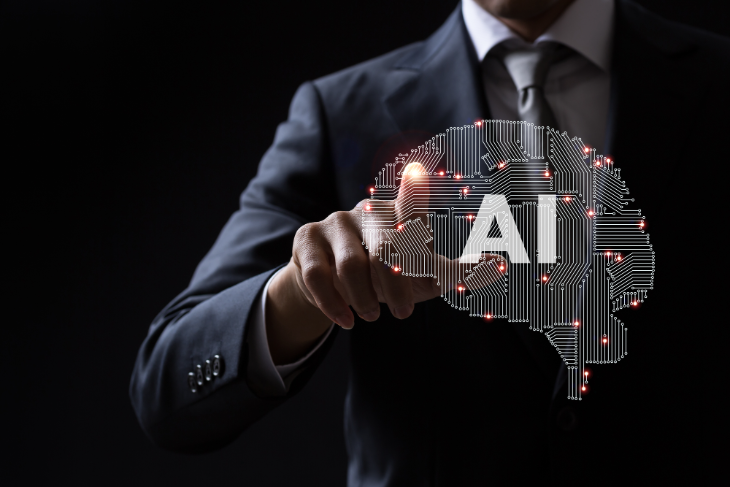We will go over the responsibilities of an AI engineer, the nature of their particular work, and the knowledge and credentials they must possess.
contents table
1. An AI engineer: what is it?
1. What an AI engineer does
1-2. What separates an IT engineer from an AI engineer
2. Particulars of an AI engineer’s work
2-1. Artificial Intelligence Development
2-2. Education
2.3. Evaluation
3. What are AI engineers’ primary areas of focus?
3-1. Businesses using AI technologies
3-2.Educators engaged in AI
3.University and research institute researchers
4. The knowledge and abilities needed by AI developers
4 to 1. familiarity with deep learning and machine learning
4-2. computer abilities focused on “Python,” a general-purpose computer language
4. Mathematical proficiency
5. Prospects and demand for AI engineers
5-1. We will always need additional personnel.
5-2. Possibility of working for substantial compensation
6. How to become an AI engineer in your career
7. The prerequisites for AI engineers
7–1. credentials that are helpful to get
7-2. Requirements for data scientists
8. It is anticipated that AI engineers will become much more important.
Artificial intelligence (AI) technologies created by several firms in recent years are now being put into use. One example of how AI is used in daily life is the chatbot feature that is put on websites to answer questions.
Among these human resources, the position of “AI engineer” is one that is growing rapidly. These human resources are collectively referred to as “AI human resources.” What is the kind of work that an AI engineer undertakes that is not well understood, despite the fact that it is anticipated to expand and change in the future?
The function of an AI engineer, the nature of their work, and the education and experience needed to fill it will all be covered in this article.
An AI engineer: what is it?
Artificial Intelligence (AI) refers to software and systems that possess human-like judgment and learning capabilities. What then is the function of an AI engineer involved in developing AI-related projects?
What an AI engineer does
AI engineers work on “AI development” using programming languages like Python, “learning” to increase accuracy via data input into AI, and “learning” to increase accuracy through verification of the AI in use. The primary responsibilities are “analysis” and AI development and operation.
Businesses employ AI to address a range of operational issues. It is necessary for AI engineers to use their technological know-how and proficiency in AI to create AI systems and guide businesses toward problem-solving.
What separates an IT engineer from an AI engineer
How are AI engineers distinct from more well-known IT engineers who build AI solutions to address business problems?
IT Professional
Developing systems in accordance with predefined plans and specifications is the primary responsibility of an IT engineer. As a result, the work process and the system to be constructed follow a quite set pattern.
AI developer
However, much like IT engineers, AI engineers also create systems in accordance with predetermined plans and requirements when it comes to AI development. But as the topic relates to AI, the necessary expertise shifts for AI developers.
For instance, whilst IT experts often use Java and C#, many other individuals utilize programming languages like Python, C, and C++. You also need to be able to utilize the numerous libraries that are used, such PyTorch, TensorFlow, and Keras.
Additionally, as was previously indicated, AI developers may be in charge of teaching AI to learn and analyze. As a result, although both IT and AI engineers conduct the same types of development, there are significant differences in the nature of their jobs and the knowledge and abilities needed for them.
Particulars of an AI engineer’s work

Now that you are aware of the responsibilities of an AI engineer, let us go over the particular tasks.
As previously said, an AI engineer’s job may be categorized into three areas: “AI development,” “learning,” and “analysis.” We will now go over the specific duties performed by each of these areas.
AI advancement
First and foremost, the creation of AI is the most crucial aspect of an AI engineer.
Deep learning has become so ubiquitous in AI development in recent years that the term “deep learning” is now often used to refer to it. We will build using these deep learning packages, which include TensorFlow, PyTorch, and Keras.
Python is a popular programming language that is used in the aforementioned packages. C or C++ may be utilized in the case of edge AI, a sort of AI that is introduced into the terminal side.
research
We will train the AI once it has been developed in order to increase its accuracy.
You must provide a lot of data to the AI you develop. This data is created and collected by AI engineers, who may also carry out operations like cleansing—the process of eliminating superfluous data.
examination
Analysis is the last phase. While there aren’t many AI engineers who do analysis, they often provide the data needed for it.
Additionally involved in the study are data scientists and analysts.
Like a data scientist, the primary responsibility of a data analyst is to examine data and provide recommendations on how to meet project goals. For example, we study data to understand client wants, build a hypothesis based on the findings, and offer what is essential to address a company’s difficulties.
A data analyst is more of an analyst than a data scientist, despite the fact that they both work in very similar capacities.
What are AI engineers’ primary areas of focus?
We will now present the workplaces where AI engineers are employed and in demand, having established the existence of their job.
Businesses using artificial intelligence
Up until recently, industries like autonomous driving often hired AI engineers. However, it is anticipated that a broad variety of businesses will need AI technology in the future due to its application in the manufacturing, banking, and medical industries, among other sectors.
Apart from manufacturers, there are businesses that specialize in AI research, SIER (system integrator) firms, and development firms that create AI systems. These companies will have more and more options to be involved in the industry.
After they are built, AI systems continue to operate. After-sales assistance, such as maintenance and repairs, is also necessary to keep the AI system operating. Thus, the need for AI experts will only grow as more businesses use AI.
AI-related instructor
Even if more businesses are looking for AI engineers now than in the past, there is still a scarcity of these professionals.
It is anticipated that the government’s AI policy would lead to the widespread adoption of AI education in the future. It is anticipated that as AI education firms, private schools and vocational schools would gain popularity in the near future.
As a result, it’s possible that their knowledge of AI will be useful to them in their role as instructors for AI-related engineers.
AI-related technology and expertise are very specialized. Therefore, your expertise and knowledge from working as an AI engineer would be very helpful if you want to become an instructor in the field of artificial intelligence.
Scholars in academic institutions and research centers
AI engineers may also pursue a specialization in AI-related technological research at academic institutions and research centers.
If you are employed by a firm as an AI engineer, you will only be creating AI for business use. As a consequence, AI developers must prioritize delivering outcomes for their initiatives.
On the other hand, while working in a university or research center, the objective is not to earn a profit but to contribute to society as a whole using AI technology. AI may also be developed with just selfish goals like “I want to know” or “I want to try.”
Instead of using current technology, there are plenty of options at universities and research centers to do fundamental research to create new AI technologies. As a result, more sophisticated AI knowledge and abilities will be needed.
The knowledge and abilities needed by AI developers

So, what exactly are the skills required for an AI engineer? From here, we will explain the knowledge and skills that are essential to becoming an AI engineer.
Knowledge of machine learning and deep learning
AI engineers analyze various data, build AI, and ultimately implement it in the form of systems to solve corporate issues.
As of 2021, AI often refers to deep learning, but depending on the requirements, machine learning may be suitable. Therefore, AI engineers should understand both machine learning and deep learning.
Programming skills centered on the general-purpose programming language “Python”
AI engineers also do development, so they need programming knowledge.
As mentioned above, Python is particularly important as a programming language. Python is used in many deep learning libraries and is a programming language that is compatible with AI technology.
In addition, depending on the site and the project, development is also carried out in C or C++ for embedded edge AI.
mathematical knowledge
Machine learning uses differential calculus, linear algebra, probability theory, statistics, etc. to analyze data. Therefore, AI development may also require knowledge of mathematics. Mathematical knowledge can be used in areas other than AI development, such as in data utilization situations.
Demand and prospects for AI engineers
So far, we have explained the skills and job content of AI engineers, but now let’s take a look at future demand and prospects.
We will continue to need more human resources
The number of companies that utilize AI for business development is increasing year by year. According to the Ministry of Economy, Trade and Industry’s “Survey on IT Human Resources Supply and Demand,” the average demand for AI human resources is expected to increase from 44,000 in 2018 to 243,000 in 2030.
However, the outlook for human resources supply is 120,000 people in 2030, and it is known that the gap between the supply and demand for average human resources in 2030 will exceed 120,000 people. Therefore, it is likely that AI-related industries will continue to need a large number of human resources.
Possibility of working with generous benefits
Becoming an AI engineer requires advanced specialized knowledge and technology, so the hurdles to achieving this seem high. However, it is a job that is in very high demand, and companies often offer preferential treatment in terms of salary to secure talented human resources, so it is possible to work with generous benefits, so it can be said that the prospects are high.
Career path to become an AI engineer

As you can see, AI engineers are a profession that is expected to be in high demand. What kind of career path is there to work as an AI engineer?
First of all, to become an AI engineer, you need to acquire “AI-specific skills” such as coding mathematical models and utilizing AI-related libraries. In addition to libraries such as TensorFlow, PyTorch, and Keras mentioned above, development skills in languages such as Python are also important.
In addition to technical skills, it is also a good idea to have data scientist and data analyst skills such as data analysis, reporting, and effectiveness verification. Even if you do not perform analysis on-site, you can expect to be involved in providing necessary data.
When considering a career path, it is common to acquire these skills and directly apply for a job as an AI engineer. However, in this case, knowledge and skills that can be used immediately are required, so depending on your skills, it may be difficult to find a job.
It would also be a good idea to first change jobs to an AI-related company as an IT engineer, gain experience in a support position, and then aim for an AI engineer position. In this case, you will be able to use your current skills to change jobs and become an AI engineer by gaining the opportunity to experience AI in the field while studying, so although it will take time, you may be able to become an AI engineer more smoothly.
Qualifications required for AI engineers
So far, we have looked at the roles, skills, job content, and career paths of AI engineers. Lastly, let’s take a look at the qualifications that are related to the career path of an AI engineer.
First of all, there are no clear required qualifications to become an AI engineer. However, to continue to be active on the front lines of an industry that is undergoing remarkable evolution, it is desirable to acquire qualifications that are useful for AI development.
Qualifications that are useful to obtain
Some of the qualifications that are useful to have include:
| G (generalist) test | This qualification certifies that a person has basic knowledge of deep learning and has the ability and knowledge to utilize it in business. |
| E (engineer) qualification | This qualification certifies that you understand the theory of deep learning and have the ability and knowledge to implement it. |
| Python3 Engineer Certification Exam | A private qualification provided by the Python Engineer Training Promotion Association. This is an exam that asks about the basics of Python grammar. |
| statistical certification | This is a national standardized test that evaluates statistical knowledge and application skills. |
G-certification and E-certification are representative qualifications related to deep learning, and they are qualifications you should obtain if you aim to become an AI engineer.
Qualifications for data scientists
If you are considering working as a data scientist, in addition to the qualifications mentioned above, the following qualifications may also be helpful.
| actuary qualification exam | This qualification certifies that you are a mathematical professional who deals with uncertain phenomena using methods such as probability and statistics. |
| oracle master | This qualification certifies the technical ability to handle the Oracle Database series officially operated by Oracle Japan. In addition to database management and operation, questions will be asked that will test your level of SQL proficiency. |
| Python3 Engineer Certification Data Analysis Exam | A private qualification provided by the Python Engineer Training Promotion Association. This is an exam that questions the basics and methods of data analysis using Python. |
These qualifications are not required to become an AI engineer. However, by obtaining a qualification, you can objectively prove the level of skill you possess, which can be useful in job hunting.
It is anticipated that AI engineers will become much more important in the future.
The demand for AI is outpacing the availability of human resources as AI developers need highly specialized expertise and technology. However, given how challenging AI is, there is also the issue of how difficult it is to apply straight to become an AI engineer.
In this situation, if you are an IT engineer now, you could want to look for a position as an IT engineer at a business that deals with AI, and then progressively move into the role of an AI engineer.
Another way to put it is that a lack of human resources equals a strong opportunity for employment as an AI developer. It is a good idea to start studying early if you want to become an AI engineer since it takes time to develop the abilities required for the position.

